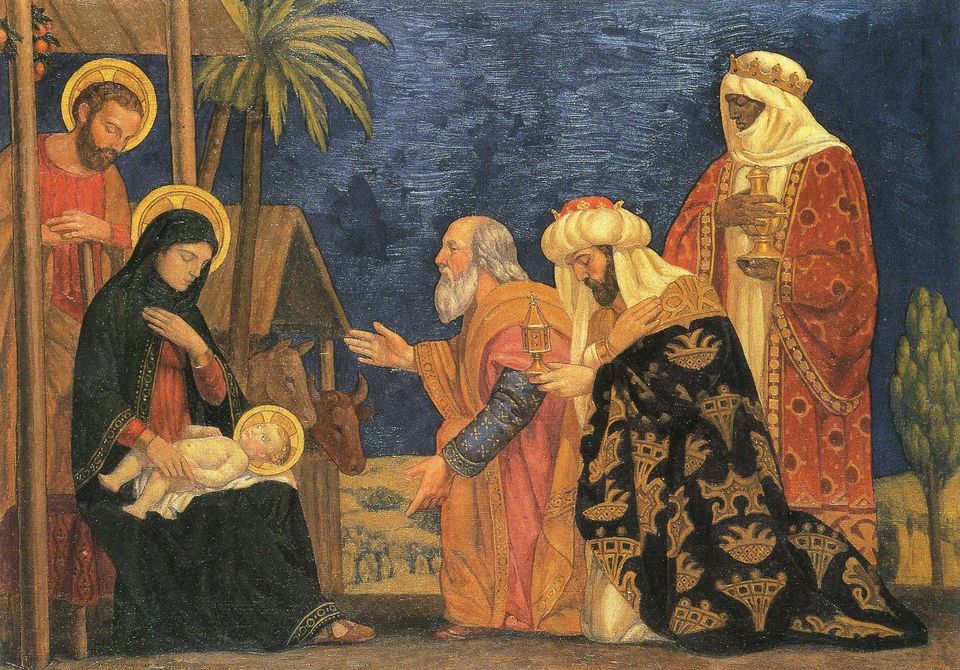Epiphany Homily
The birth of any child is an Epiphany, a manifestation of the loving kindness of God, who gives us the gift of new life made in his image and likeness. Many of you here this morning will know what Mary and Joseph felt when they saw visitors arrive to see the baby. They were probably surprised when a group of shepherds came in the middle of the night. Their message, given to them by the angels, of the birth of a saviour caused Mary to ponder and treasure in her heart everything she knew about her child and the fact that she had remained a virgin after his birth. Then there was his name, Jesus, the Holy Name revealed to Mary by the angel Gabriel at the Annunciation and to Joseph by an angel in a dream.
But now, twelve days later, here come wise men from the east bringing gifts. They tell how they have followed a star and have come to do homage to the infant King of the Jews, a title we will meet again at his crucifixion. Expecting to find him in a palace in Jerusalem rather than in a stable at Bethlehem, they visit King Herod, asking to see the child. Herod is taken aback and tries to trick the wise men so as to discover who and where this child is. He then conspires to kill all male children born in the last two years. The Magi continue to follow the star until it comes to rest over the place where the child lay. “The sight of the star, “ writes St Matthew, “filled them with delight, and going into the house they saw the child with his mother Mary, and falling to their knees they did him homage.” Then they open their treasures and offer him their prophetic gifts, gold for a king, incense for a god and myrrh for a dead man, The three gifts must have given Mary a great deal more to ponder over and treasure, but soon the flight into Egypt, to protect the life of her child, and living as a refugee will give her more to think about, preparing her for his passion and death thirty years hence.
But what happened to the wise men? St Matthew simply says, “They were warned in a dream not to go back to Herod, and returned to their own country by a different way.” God spoke to them in a dream just as he spoke with Joseph. While Joseph takes Mary and Jesus as migrants to Egypt, the wise men return home “by a different way.” Now it could simply mean that, to avoid seeing Herod again, they took another route, but the word “way” always has a more significant meaning in the New Testament. One day Jesus will say, “I am the Way,” and the first Christians became known as “followers of the Way.” The way the wise men took was Christ himself. They had recognised the babe in the manger to be God Incarnate and had knelt down in worship. What had been revealed to them in this great manifestation of God’s love and mercy would guide their lives from then onwards, as it does our lives today.
The Epiphany is the greatest of feasts: Advent and Christmas prepared us for today. In the early Church it ranked with Easter and Pentecost, which is why we solemnly read today the proclamation of Easter. Although we now emphasise the coming of the Wise Men and Christ’s manifestation to the Gentiles, the Epiphany celebrates the threefold revelation of Christ to the world: his Birth at Bethlehem, his Baptism in the Jordan and the first Miracle at Cana in Galilee. Known as Easter in Winter, it was traditionally set apart for the rites of Christian Initiation, so it’s an appropriate day for two young men in the congregation, Iestyn and Ostyn Gillick, to make their First Communion. They have been prepared for the Sacrament by their father, Gabriel. This, of course, it what should happen in every family. It is the duty of parents to instruct their children in the faith. So today we pray for Iestyn and Ostyn. They haven’t brought gifts of gold, frankincense and myrrh, but something more precious, they have brought their hearts and their love for Jesus.










